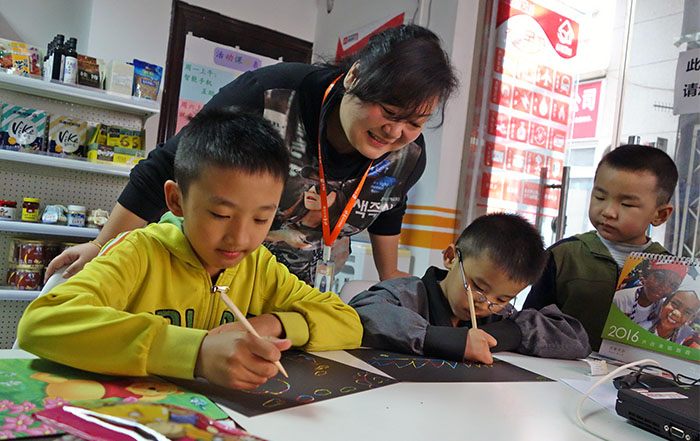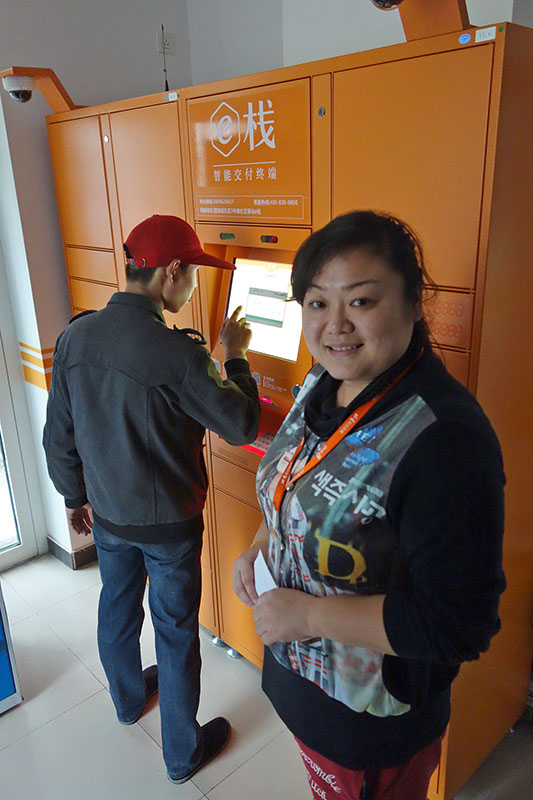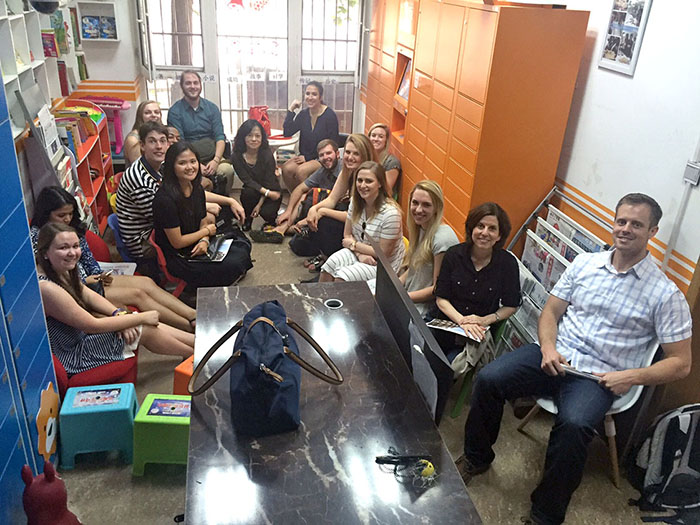
In which UNC-CH Senior Lecturer Jock Lauterer returns to China for the fifth year to teach Community Journalism in the hopes that positive social change, community building and civic engagement might be affected by the growth of “relentlessly local” news outlets. It’s a long shot, but the ol’ perfesser (who the Chinese call “Mr. Joke”) has no illusions about how long it might take for his “seeds” to sprout — or what they will look like! In this newest installment, yr fthfl svt becomes the student.
Three little boys rush in out of the rain, plop down at child-sized seats at a low table, grab colored pencils and throw themselves into their artwork.
“There, that’s good! A pretty flower!” says Zhao Na, a matronly 36-year-old, bending over the boys with all the encouragement of a summer camp counselor.
Is this journalism?
It is, in Beijing, China.
The face of community journalism — a relatively new phenomenon in the old Middle Kingdom — is rapidly changing as traditional advertising here, as in the US, is shrinking. New sources of revenue and new roles for the media are being explored, none more exciting to my way of thinking than the creation of community “stations,” pioneered by the Beijing Youth Daily with plenty of big money behind the initiative

In the last two years, Beijing Youth Daily has opened 110 neighborhood multi-purpose stations that provide middle-class apartment dwellers with hard-to-find services like after-school care, computer services, online shopping and secure package delivery.
On this drizzly Beijing morning, the open-door station at Glory City apartment complex has the comfy feel of an old American general store, but with all the technical glitz of an Amazon prime with a human face.
“It makes this a better place to live,” says Station Director Zhao, who has worked here since the Glory Road station opened two years ago. “It helps people deal with things.” And, she adds, “I enjoy it. It’s good to be with the residents too.”
Backed by a 40 million yuan investment by visionary Jack Ma of Alibaba, the BYD station creators realized that these neighborhood nodal points could meet a real need, providing a central “pick-up-and-drop-off” spot for the burgeoning industry of online shopping.
This is especially true, my host, Prof. Chen Kai of the Communication University of China, tells me, in the densely populated vertical urban apartment tower environment typical to most Chinese cities.
“The Beijing Youth Daily has been very selective about where top set up these stations,” she says. “They need to be where there is a densely populated complex that is gated and has a property manager, and where the people are not too rich but not too poor. If they are too rich, they don’t need the services – if they are too poor, they can’t afford them.”
With the explosive growth of the Chinese middle class, maybe Alibaba and the Beijing Youth Daily have found the sweet spot.

THE NEW BUSINESS MODEL
It will surprise no one who has studied the economics of the newspaper industry that print is not going away anytime soon. Bottom line: it’s where the money is.
So, in addition to the stations, the forward thinking Chinese newspaper companies are banking on a three-pronged business model that embraces online digital hyper-local reporting coupled with special events (such as product showcasing, workshops and seminars) and maintaining a robust print product.
Professor Chen explains, “What the Beijing Youth Daily can teach us is that there is still value in the print newspaper. While they want to transition to online only, they realize the necessity of keeping a print presence for credibility. Because anyone can have an online site. With the Beijing Youth Daily, the print news is their edge.”
And significantly, she adds, “The Beijing Youth Daily tried to make it in some neighborhoods with digital only community news websites, but they didn’t work,” citing one case where the publisher told her emphatically, “’Even if I print only 10 papers, I still have to have a print newspaper to distinguish me from the others!’”
This brings up an important point. Chen tells me that this phenomenon allows Chinese publishers to cut back on their press run, thus saving money on ink, paper, production and delivery.
“Print,” she tells me, “is part of the mix now. A very important part of the mix.”
BACK AT GLORY CITY
The stations simplify newspaper delivery too, giving the paper a central distribution point and eliminating the necessity of “home delivery” which, in multiple 32-story towers, can be daunting.
When the weekly edition of the Chong Wen Men Community News arrives at Glory City Station on Thursday morning the 150 copies are quickly snapped up. All gone by Friday evening, station director Zhao says.
Finally, there’s the aspect of branding. The stations not only make money, they also endear the media outlet to the neighborhood by providing multiple services heretofore unavailable.
“Is this a community-building project?” I ask Zhao.
Her eyes light up as she replies emphatically, “Yes!”


